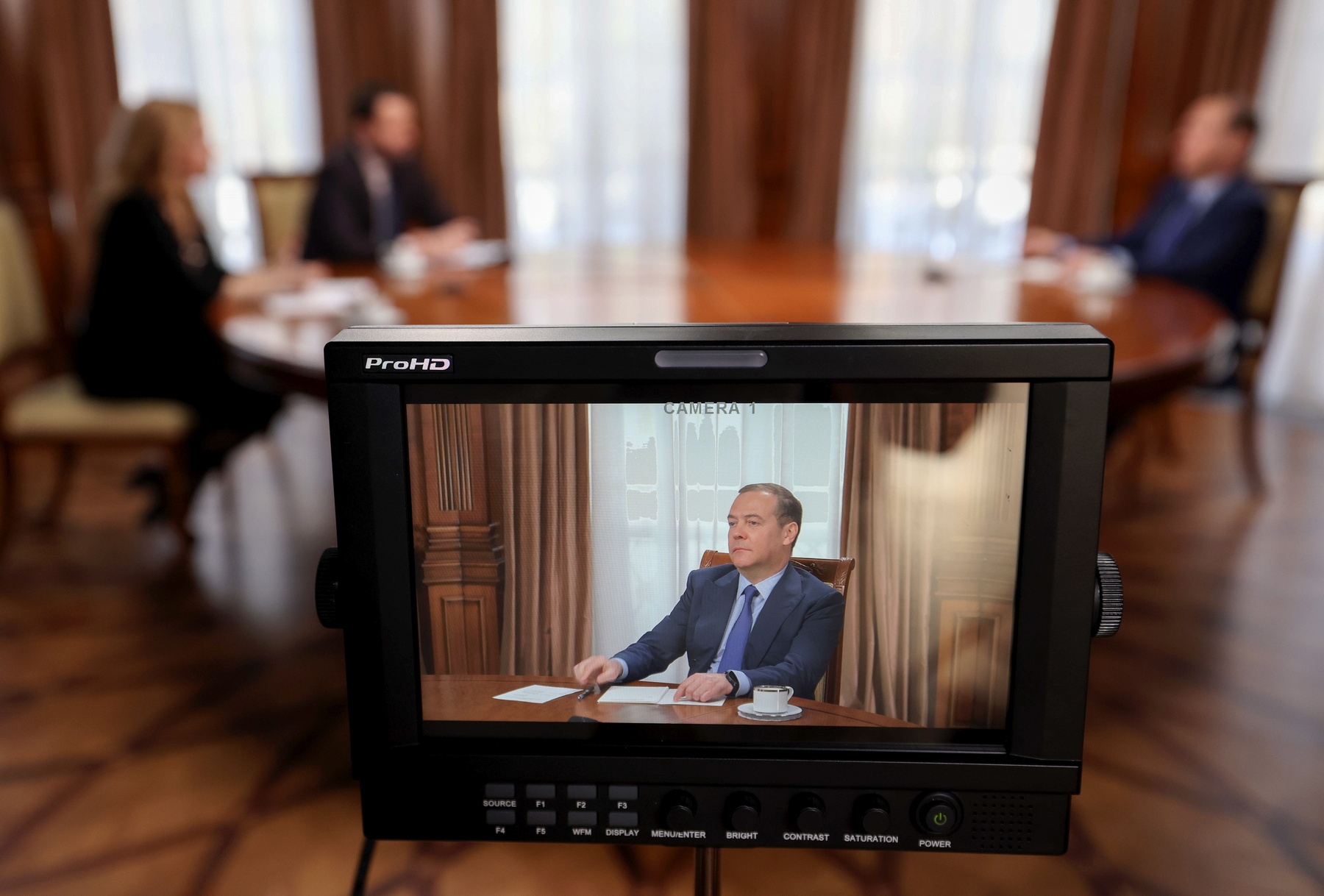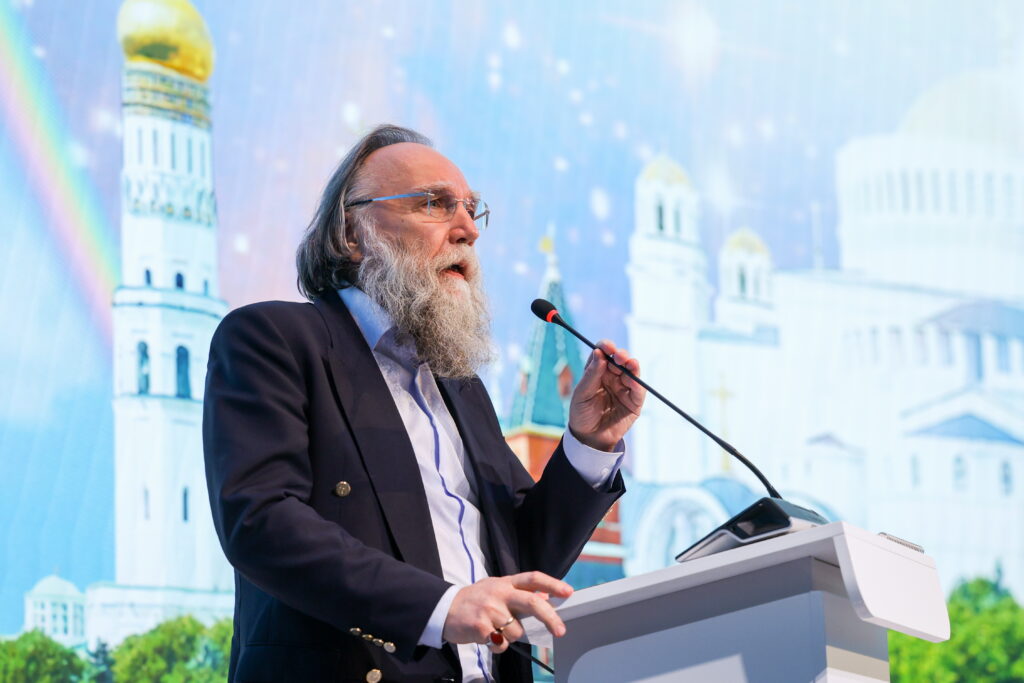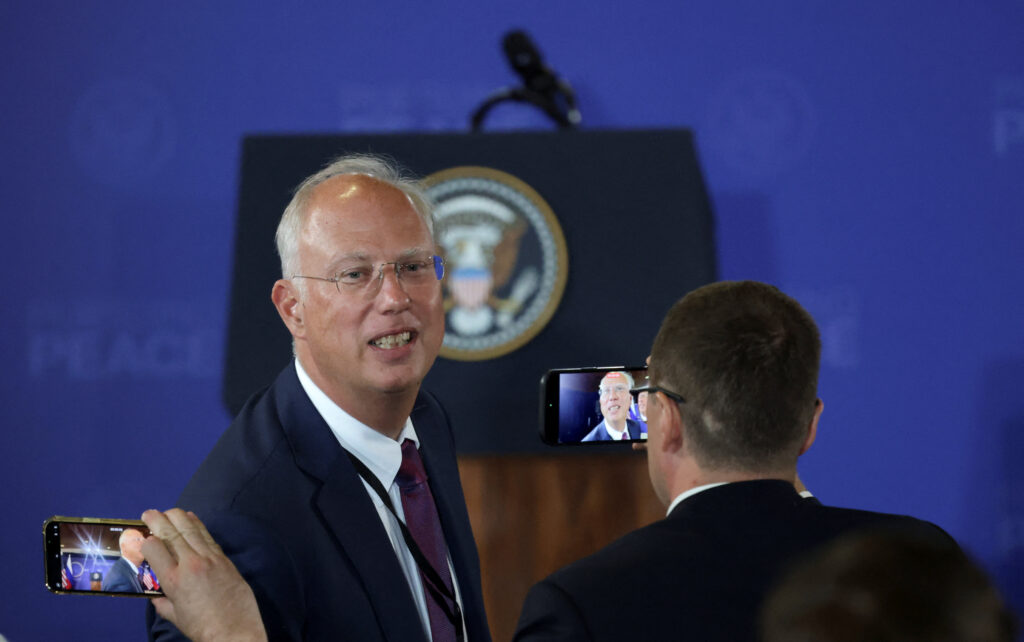Russia’s ruling elite have stooped to new propaganda roles since February’s invasion of Ukraine. The initial example is not an excerpt from the trash streams of TV presenters Vladimir Solovyov or Dmitry Kiselev. Instead, it is is a post in the telegram channel of a former President of Russia, Dmitri Medvedev, who is now Deputy Chairman of the Security Council:
«Ghost of Kyiv», an image of an aircraft, which is taken from a computer game. A drone shot down by a can of cucumbers. Surrendered to the Russian warship «dead heroes». Mariupol maternity hospital, now — Bucha. What unites them? These are fakes, ripened in the cynical imagination of Ukrainian propaganda. Numerous PR agencies, «troll factories» run by Western governments and their «pocket» NGOs that cook them for huge amounts of money."
Here, Medvedev is trying to respond to the discovery of dozens of civilian corpses in the Ukrainian city of Bucha, from which the Russian military had retreated. At the end of his post, Medvedev announces the coming change in the consciousness of Ukrainians (and before that — the eradication of «deep Ukrainianism», whatever these words mean), and the construction of «open Eurasia» from Lisbon to Vladivostok.
These outbursts have not come in isolation. The deputy chairman of the Security Council, ever since the outbreak of war, has been making anti-Western statements several times a week. He echoes State Duma Speaker Vyacheslav Volodin, or even Chechnya’s leader Ramzan Kadyrov, Returning to his former activity on social networks, Kadyrov reads foolish poems and calls to take Kyiv. Meanwhile Ella Pamfilova, head of the Central Election Commission (CEC), joins the crescendo, speaking about the Donbass at a commission meeting. And now, the letter Z appears in the CEC logo. VEB head Igor Shuvalov airs his views in an interview on RT, while Moscow Mayor Sergei Sobyanin speaks at a Z-rally in honor of the anniversary of the annexation of Crimea. Cleaarly, the basis of a new style of self-presentation among the Russian elite is a lashing out at enemies and a servile expression of loyalty to the president.
Kremlin has many towers
For a long time, Russian politicians and officials have built their own image and style of communication with the audience and with each other. Medvedev from the mid 2000s til 2020 tried to be known as a liberal and a supporter of innovation. Prime Minister Mikhail Mishustin still maintains the image of a modern, efficient manager and at the same time a sincere person. Moscow Mayor Sergei Sobyanin cultivates the image of a strong business executive, but not a character like the former mayor, Yuri Luzhkov. State Duma Speaker Vyacheslav Volodin is a statesman who shares the status of Putin’s most loyal infantryman with Chechen leader Ramzan Kadyrov. Sometimes these images coincided with reality, sometimes not (as it turned out, Medvedev was not a liberal at all). But the bottom line was that the Russian elite (at least its facade) really had a heterogeneous structure. It included both moderately pro-Western characters (Medvedev, ex-Finance Minister Alexei Kudrin), and «ultrapatriots» (such as the head of Roscosmos Dmitry Rogozin, Kadyrov and Volodin), all working alongside emphatically apolitical technocrats (government officials and, oddly enough, the head of the political bloc of the Kremlin Sergey Kiriyenko).
Of course, they were by default loyal to Putin, but this loyalty was by default. Only Ramzan Kadyrov, who constantly called himself «Putin’s infantryman», and State Duma speaker Vyacheslav Volodin regularly swore allegiance to the president aloud. The latter separately became famous for his statements «No Putin, no Russia» (2014) and «After Putin there will be Putin» (2020). By and large, though, such ultra-loyalist behavior was considered rather marginal; flattery towards the president was considered too obvious and crass. After the annexation of Crimea and the conflict in eastern Ukraine in 2014, the employees of the Ministry of Foreign Affairs, headed by Sergey Lavrov, articulated the aggravation of relations with Western countries in the media; they could be singled out as a separate group. Indeed, they were allowed to make completely undiplomatic statements about colleagues from the US and Europe and the leaders of these countries. So the speeches of Foreign Ministry employees gathered a propagandistic hue.
The public image of a politician, as a rule, correlated with his position. Each official or politician conventionally had his own sphere of responsibility, beyond which he should not go. Dmitry Medvedev, in the rank of prime minister, could not adopt the rhetoric of the Foreign Ministry and attack colleagues from other countries. Ella Pamfilova, after moving from the post of Commissioner for Human Rights to the Central Election Commission, spoke only about the elections. Sergei Sobyanin, for instance, spoke of a prettier Moscow. The speaker of the State Duma, Vyacheslav Volodin, did not get involved in economic issues. The system—albeit formally enough—envisioned itself as a set of characters with expertise and practical skills within their industry. It was believed that Putin was accustomed to relying on the opinion of these «expert» officials and listened to them. Despite the decisive vote of the President, the Kremlin and the Government had many different towers and voices. In a way, having a voice of one’s own that could sometimes be listened to was a sign of elite status. Political analyst Yevgeny Minchenko called this decision-making system Politburo 2.0 (by analogy with Soviet times).
Your own propagandist
The situation changed after February 24, 2022. The new model of self-presentation of the Russian elite is best illustrated by Dmitry Medvedev’s public statements. First, he has dramatically increased his publicity and can make several posts a week on a far wider range of topics than before. The Deputy Chairman of the Security Council is ready to talk about food, hydrocarbon supplies, and the official positions of foreign states. And he will talk in a more shrill language than before. «Not all states will successfully cope with such a recession, despite the hysterical statements of the national leaders of Western countries, splashing in all directions with saliva boiling with indignation,» he says in a post about the consequences of sanctions for Western countries. He adds: «the sanctions have not yet achieved the results that Western politicians managed to shout about with their voices weakening from effort.» At the same time, he calls Polish politicians a «community of imbeciles.»
The new image of Medvedev is full of ultra-patriotic rhetoric. «Russia is taking its place. This place is destined for her by history and, if you like, by the Lord God. Russia is Russia» he says in an interview with RIA Novosti. In the same interview, he insults US president Joe Biden: «From time to time we hear absolutely extraordinary words, but we are well-mannered people and we never get personal. No one talks, for example, about the fact that there are people who have clearly expressed signs of senile dementia or who are already on the way to senile insanity. No one thinks of grandfathers who fall on the stairs of the plane, who cannot find the right direction to go to their office and go somewhere in the bushes».
Medvedev’s rhetoric is now a synthesis of speeches by representatives of the Russian Foreign Ministry, ultra-patriotic statements by Volodin, or hosts and participants in Russian geopolitical television shows. This is an average image of a Russian official who is extremely loyal to the authorities, who is ready to constantly take an oath to the regime — to publicly scold his enemies, demonstrate super-patriotism and support Putin’s decisions.
For State Duma Speaker Vyacheslav Volodin, statements in this spirit are commonplace. But since the start of the war, the speaker has dramatically increased his presence in the public space. On the very first day of the invasion, he came out in support. On March 1, he lashed out at cultural figures who spoke out against the hostilities and urged them to «decide» as soon as possible. Volodin quickly sided with Putin’s decision to sell hydrocarbons for rubles and even called for all Russian exports to be traded in rubles too. In this case, the speaker of the State Duma has clearly gone beyond his role and expertise, but this is just the new way of self-presentation of the Russian elite. The playbook is thus: hear from the president about some of his decisions — immediately support him, or better. offer to expand and deepen on his thinking.
A few more examples of loyalty oaths:
«Today we are all together, at the same table, shoulder to shoulder, like the entire electoral system of Russia, like our entire large country. I am proud that I have the honor to lead the electoral system of our Great Country, the main backbone of which is made up of people with a strong spirit, a noble sense of civic duty and the highest responsibility! — such a quote by the head of the CEC, Ella Pamfilova, appeared on the Commission’s Telegram channel.
Former Deputy Prime Minister and head of VEB, Igor Shuvalov: «The economy has weathered several stress tests quite well. They allowed us to strengthen the economic system. We must be in good shape and use our wealth to make the form even better. Of course, it will be so,» he assured in an interview with RT.
Elsewhere, there’s Ramzan Kadyrov, trying to read a poem; or the head of Roscosmos, Dmitry Rogozin trying to joke on his Twitter.
Entertain and conquer
Public images of Russian officials and politicians are gradually being unified. Some governors are trying to keep up with their federal counterparts. For example, the head of the Kemerovo region and the husband of Putin’s cousin, Sergei Tsivilev, decided that the name of the region he rules would be spelled KuZbass. Similarly, the head of Bashkiria, Radiy Khabirov, came to a hockey match with a poster with the letter Z. But still, at the level of heads of regions, the transition to a new style is not so noticeable.
These «new style» texts (in the broad sense of the word) have only one addressee, and that is Vladimir Putin. Messages addressed to him from certain members of the elite appeared before. However, in their other texts and speeches, they also addressed other addressees (Russians, other members of the elite, foreign colleagues), presenting themselves as «experts» or people who influence decision-making. Now the circle of possible recipients has narrowed down to one, it is enough to present yourself only to Putin. These signals also reach ordinary citizens, although they are not directly addressed to them. They are integrated into the general propaganda flow and for the loyalist audience they serve as evidence of the rallying of the elites under military flags; their readiness to stand in the battle with the West to the end.
A direct appeal to the citizens of the country, other top figures, and even more so outside the country, will only cause suspicion of disloyalty: why do you need to communicate with someone other than the president, who has become the source of power. As an exception, one can name a character who is trying to flirt with a more mass audience — this is the same Dmitry Medvedev. «We’ll eat breakfast ourselves ???☕️. Perhaps we will share lunch with friends??/??. And we will not give dinner to the enemies???. They will do without. We’d better eat it ourselves too and the morning we’ll work out more actively??♂️???!» — wrote Medvedev. The playful emoji appeared in an official post about grain exports published April 1. Medvedev threatened «unfriendly countries» with a «silent weapon» — stopping food supplies. Threats of starvation are significant (although neither Europe nor America depend on Russian food exports). The use of emoji is understandable and close to Instagram regulars, but even here the hand of an experienced courtier is visible. Putin definitely does not use Instagram and does not recognize the reference to the audience of this social network.
In this context, it becomes clear why the new style of self-presentation of the Russian elite uses the language and style of propaganda TV shows. Putin watches them and often speaks the same language himself; it is what speaks to him. Politicians and officials who use this language seem to be approaching Putin, and the most experienced courtiers try to entertain him with low-key jokes. In a sense, this is entertainment. The elites have realized that the president has ceased to be guided by anyone’s opinion and wants to be agreed with.
As far as the author of the text knows, Putin decided to sell hydrocarbons for rubles without consulting the financial and economic bloc of the government. Most likely, a radical change in Putin’s mind and his final rejection of the elements of the deliberative model of making key decisions for the life of the country happened during quarantine. The number of Putin’s meetings, even with people from his inner circle, has sharply decreased, and this has especially affected collective formats. The president entrusted operational, tactical actions to subordinates, and began to make key decisions himself.
Many Russian politicians and officials turned out to be ready to turn from representatives of the elite into propaganda servants entertaining the leader (without laying down their main duties). Political analyst Konstantin Gaaze noted back in 2017 that instead of the Politburo, the court began to enter the political forefront — a circle of people who are ready to provide the president’s personal comfort and leisure (from the bureaucratic obligation to build his schedule to the construction of palaces). The courtiers had to give up their public status, in return getting the opportunity to independently resolve some important issues for themselves, trying not to bother the president with their problems.
Now, members of the court or Politburo who are most sensitive to Putin’s mood understand that to have the same level of loyalty in the eyes of the president, you need to put on a fool’s cap and return to the public sphere — just not with your own opinion, but with an oath. This may open the way to promotions. Or, at least it will help keep your job and avoid repression. Due to economic difficulties, the search for elite scapegoats will inevitably begin. Medvedev writes about traitors, so that, God forbid, he himself is not appointed as one too.










